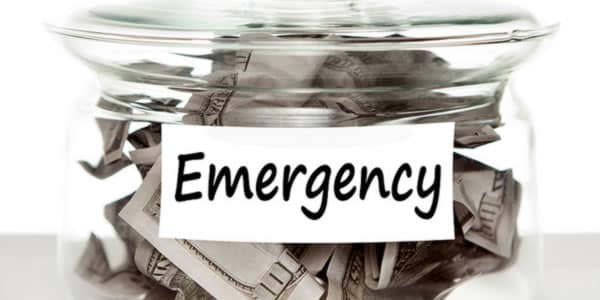Have an emergency fund? How healthy is it? Fewer of us have three months salary stashed these days than we did five years ago. It makes sense – tough economic times are the very reason we faithfully stash that money away. For even more of us, we have a tough time getting back into the savings game once things improve. It’s important, though, and should be a top priority for everyone.
Emergency funds are about peace of mind. The only thing worse than an unexpected job loss is the realization that there’s no money to help you transition into a new position. If you’re planning a weekend getaway, your emergency fund shouldn’t be what finances it. Imagine going away for a few days only to come home and receive that dreaded pink slip. Now what? You used your emergency fund for an impromptu vacation and now you’re cornered with nothing but worry about covering next month’s utility bills.
Just to clarify – your emergency fund should include at least three months salary -and some analysts are now saying it should be a six months salary – into a seperate account. It’s used only for those unexpected expenses, job losses or other financial difficulties. Our advice is to put into savings account so that you’re earning a bit of interest.
You have to get out of the way of thinking that your 401(k) is your emergency fund. First, it’s getting tougher to borrow against it and even if you are able to jump the hurdles, it takes time – and in an emergency, time is often a luxury you can’t afford. Plus, it’s going to cost you if you borrow against your retirement. With an emergency savings account, if you select the right kind of savings account, you’ll actually earn money.
Some people say their emergency funds has freed them from worrying about changing jobs.
Knowing I had four months stashed away sort of liberated me. I was able to seek new employment with confidence. If my then-current employer had found out I was seeking a new job, I’m sure I’d have been let go. Money stashed meant I could let go of that worry.
said one consumer.
There’s also another school of thought that says an emergency fund can allow you to rethink things like insurance deductibles. They say raising your deductible means savings on your policies, which can then be put into your emergency account. It’s a brilliant idea, but remember with that avenue, you must have self discipline. If done properly though, you can continue to move forward with the same dollar amount deposited each month while also taking the savings from your insurance policy changes and add that to your account. Consider it a double-dip.
It’s also a good idea to keep your account in the back of your mind should you receive a notice from your credit card company that it will be raising your interest rate. Your emergency fund can be used to pay down as much of your credit card balance as possible before the higher interest rate kicks in. Again, this too requires discipline – it’s all about replenishing that account as soon as you can should you use it for something like this. Another option – and one that might be smarter – is to find a new credit card with a balance transfer option – preferably with a 0% intro rate. Look at it this way: you can pay down your debt and scramble to knock as much out before the interest rate hike, along with whatever your current APR is or you can transfer that balance to a credit card with a lower rate and without having to pay interest on that transferred balance.
While we wouldn’t ordinarily suggest your emergency fund is applicable in the home buying process (it’s not an emergency, after all), it can play a signficant role in the approval process. Plus, closing costs often are more than many homeowners realize and you can be sure there have been times when an inability to come up with thousand dollars for an appraisal and survey meant the deal falling through.
If you’re looking to pay cash during the holidays, your best bet is to start a Christmas or holiday account. Skip using your emergency funds for these kinds of purposes. Again, it goes back to the vacation/pink slip scenario. If you use your emergency funds in December and then in January, you lose your job, then all that discipline you exhibited in saving for an emergency goes out the window.
Finally, opt for a pain free choice in saving. Specify a dollar amount to be automatically deposited each payday. This way, it’s off your mind.
Your turn to tell us: do you have an emergency fund? Have you used in the past for an emergency? Talk to us on our Facebook page or leave us a comment below.




